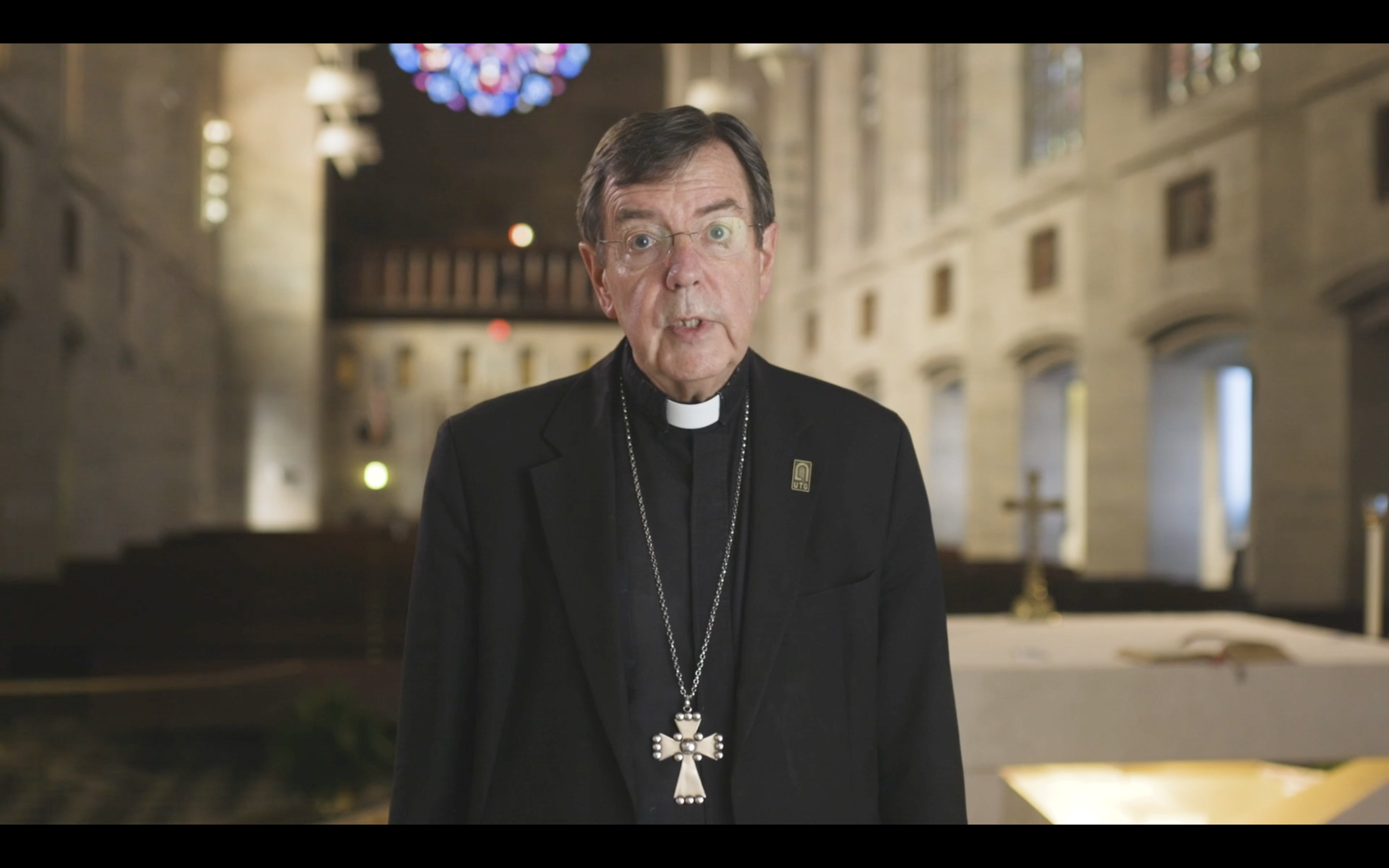Third annual conference focuses on second prong of ‘Encounter, Grow, Witness’ paradigm: the ongoing importance of growing in faith
DETROIT — Archbishop Allen H. Vigneron told attendees during the Archdiocese of Detroit’s third annual Parish Day of Renewal that in order to serve Christ’s faithful, parish staff must first cultivate their own relationship with Christ.
Throughout the Nov. 20 conference, parish staff were offered words of encouragement to live as missionary disciples with a special emphasis on the “Grow” portion of the archdiocese’s tri-fold “Encounter, Grow, Witness” paradigm.
While this year’s conference was presented virtually, parish staff were still able to hear from key leaders in the archdiocese’s Office of Evangelization and Missionary Discipleship and were given the opportunity to diffuse the message in small-group, Zoom breakout sessions.
Both Archbishop Vigneron and keynote speaker Julianne Stanz, director of parish life and evangelization for the Diocese of Green Bay, acknowledged that parishes have faced unprecedented challenges in 2020, operating heroically with limited funds, staff and resources.
But it is not all in vain, Archbishop Vigneron said.
“Our work to unleash the Gospel is not stymied by a pandemic, because it is God’s work, and He is in control,” the archbishop said.

He emphasized that in the months ahead, parish staff will hear more about the archdiocese’s transition to “families of parishes,” which he said he confidently believes will put the archdiocese more firmly on a path toward becoming an evangelizing Church.
Following last year’s conference and its emphasis on encountering Christ, the archbishop said the local Church’s attention for 2021 will turn to the second prong of its “Encounter, Grow, Witness” paradigm.
“Today, I want to give you some words of encouragement and support for this upcoming year, where we will give special focus to the middle part of our ‘Encounter, Grow, Witness’ evangelization paradigm: namely, how we hear the kerygma and respond with faith and abandonment to the will of Jesus. We are called to follow him and we say yes,” the archbishop said.
One of the key ways Catholics can grow in their faith is by committing to a regular habit of reading Scripture, the archbishop said.
“Each of us has to intentionally build the habits of discipleship in our lives,” Archbishop Vigneron said. “I would much rather that you be ineffective as the world would judge, if in your ministry if you are committed to a life of daily prayer, reading and Scripture.”
As part of the conference, Anita Houghton, associate director for the Office of Evangelization, announced a new resource available for parishes, called the “Detroit Model of Evangelization,” and an accompanying SPARK knowledge database, both available through an online workshop.
The model offers guidelines on how to structure parish programming to meet the goals of equipping, empowering, supporting and sending forth individuals and families in mission. SPARK is a comprehensive database that includes a plethora of resources, training programs and best practices to help guide pastors and parish staffs as they seek to implement the action steps as laid forth in Archbishop Vigneron’s 2017 pastoral letter, Unleash the Gospel.
The centrality of prayer
In her keynote address to conference participants, Stanz emphasized the importance of prayer in any parish staff’s daily routine.
“We cannot do our work in ministry without prayer; prayer is essential,” Stanz said. “This method of prayer, of going away to pray (in solitude), is the method modeled by Jesus the master.”

Stanz said prayer and mission are intimately connected, adding prayer tills the soil for the work of missionary discipleship. The pandemic has given parishes an unprecedented opportunity to pause, reflect and pray about their ministries in order to reassess their effectiveness, Stanz added, calling the coronavirus-related slowdowns “the time of the great pause.”
“We have many activities in the Church and many programs, but activities and programs do not equal discipleship,” Stanz said. “Discipleship is about a relationship with Jesus Christ and his body, the Church.”
Prayers is the touchpoint where a Christian’s desire to grow in friendship meets God, allowing Him to speak, Stanz said. “Prayer is a relationship with God, who deeply desires to be in an intimate relationship with us,” she said.
Stanz encouraged parish staff not only to revive their personal prayer lives, but also to set time aside to pray together as a staff.
“Let prayer be the heartbeat of our missionary discipleship efforts,” Stanz said.
Strength in (small) numbers
Archbishop Vigneron also highlighted the role of community in the life of missionary discipleship, particularly in the form of small groups.
Especially in light of the challenges that continue to prevent large gatherings, small groups “are an opportunity for Catholics who have encountered Christ to help each other by support, mutual prayer and accountability, to conform their lives more fully to Christ in his Catholic Church,” Archbishop Vigneron said. “This will help build up leaders who will build up a culture of evangelization and discipleship in our parishes.”

Stanz said the pandemic has only brought more attention to the loneliness and isolation many people feel.
“Everybody wants to be known and loved,” Stanz said. “Everyone wants to be seen and heard. We have a unique opportunity at this time in the life of the Church to invite, welcome and include people as never before. The world more than ever needs the presence of joyful, faithful witnesses.”
The focus, Stanz added, shouldn’t be on all of the parish’s extracurriculars and programs, but rather on individual relationships and learning the art of accompaniment.
“Keep on going in ministry — don’t allow yourself to have a mindset that we have shut down. The Church has not closed. Mission has not ended,” Stanz said. “You and I can carry out the mission of the church by being Christ’s hands and feet and body in the world today.”
The archbishop said the Church’s success in unleashing the gospel is beyond its own human ability.
“It requires our abandonment in Jesus to the point of saying with St. Paul: ‘I live; yet not I, but Christ lives in me,’” Archbishop Vigneron said. “This is certainly a tall order, a great demand, but it is ultimately a tremendous gift from God worth every ounce of effort we make.”










